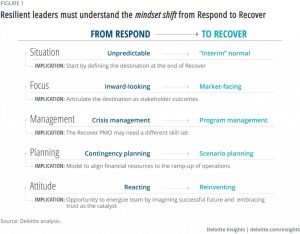Resilient Leadership
As 2020 is shaping up to be the year of uncertainty for businesses, it is also proving to be a testing ground for organizational leadership. Executives around the globe are dealing with issues they never imagined. Without a playbook on how to successfully navigate the situation, they need to rely on their soft skills more than ever before. The idea of resilient leadership is one that has taken center stage when managing through the unknown. As quoted in the Wall St. Journal, Henry Kissinger put it in context, “The historic challenge for leaders is to manage the crisis while building the future.”
A recent article from Deloitte speaks to the topic, “Resilience is not a destination; it is a way of being. A “resilient organization” is not one that is simply able to return to where it left off before the crisis. Rather, the truly resilient organization is one that has transformed, having built the attitudes, beliefs, agility, and structures into its DNA that enable it to not just recover to where it was, but catapult forward—quickly.”
The article talks of three stages that business and their leadership must go through during uncertain times – respond, recover, and thrive. Most businesses have entered the ‘recover’ phase at this point and the illustration below speaks to the mindset shift leaders are facing as they enter the new phase.

In the wake of the pandemic, a number of accepted business practices are forever changed. There is a heightened awareness to ensure employee safety, wellbeing, and emotional support. Consumer behaviors and expectations are going to be different. Working locations and methods are expanding, and financial planning needs to account for even more variations than previously expected. In many ways, recent events have exposed that much of what we took for granted has been replaced with ‘unknown unknowns’.
Trust has never been more important for leaders than it is today. It is a catalyst for recovery. In uncertain times, employees are looking to their leadership for reassurance and guidance out of the wilderness. However, trust must be earned. Deloitte speaks to two aspects of trust that leaders will need to embrace.
-
It is a tangible exchange of value
“Trust is only built in relationships, where a real, genuine give-and-take provides mutual value. Trust is also accretive: Invested wisely and prudently, it grows through repeated affirming experiences; when invested poorly, it rapidly depreciates. Further, research demonstrates that trust also yields results such as economic growth and shareholder value, increased innovation, greater community stability, and better health outcomes.”
-
It is actionable, human, and multidimensional
“Trust is nurtured and built among stakeholders along four different dimensions: physical, emotional, financial, and digital (figure 2). And trust starts at the human, interpersonal level.”
We have not seen a recovery of this scale or scope in our lifetime. To be successful, Deloitte recommends you make clear choices along the following four dimensions:
Define the destination. Envision what being wildly successful looks like at the end of the recovery, and determine what immediate steps can be taken to move quickly and decisively toward it.
Anticipate outcomes. Ensure that the path to success is defined by stakeholder-focused outcomes rather than internally focused functional processes.
Run sprints. Use agile principles to navigate the range of uncertainties—beyond just epidemiological factors—that the organization must traverse in the journey from its current state to the destination.
Judge your timing. Carefully sense when it is appropriate to pivot to Recover.
We recommend reading the article for additional detail of each of the four dimensions as well as strategic questions to consider and areas of consideration. If you have questions on building a culture of resilience and creating trust, send us a note, and one of our retained executive search consultants will respond accordingly.